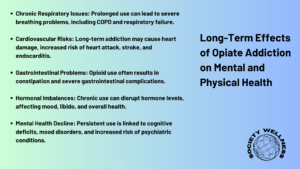Consuming opiates can indeed reduce pain and boost your energy to do regular chores but taking it frequently can leave dangerous side effects on your body.
According to research, millions of people worldwide are impacted by the serious public health epidemic of opiate addiction. Although the short-term effects of opiate use are widely known, effective treatment and preventative measures depend on an understanding of the long-term effects on mental and physical health.
we will look into the long term side effects of opiate addiction and partial hospitalization programs to reduce its effects. So, let’s go!
What are Opiates?
The opium poppy plant naturally contains a class of medicines called opioids. While some prescription opioids are manufactured directly from the plant, others are created in laboratories by scientists employing the same molecular structure. Because they include molecules that relax the body and can reduce pain, opioids are frequently utilized as medications.
Although certain opioids can be used to treat diarrhea and coughing, the majority of prescription opioids are intended to treat moderate to severe pain. Opioids are occasionally used for non-medical purposes since they can also produce an extremely relaxed and “high” feeling in users. Heroin is one of the most potent opiates on the planet and is never prescribed in the US.

Physical Health Consequences
1. Chronic Respiratory Problems
Long-term opiate usage can seriously damage breathing ability. Opioids depress the respiratory system, which increases the chance of developing chronic obstructive pulmonary disease (COPD) and other chronic respiratory issues like pneumonia and bronchitis. Prolonged use of opiates might lead to respiratory failure in extreme circumstances.
2. Cardiovascular Problems
Addiction to opioids has been associated with several cardiovascular problems, including as endocarditis, collapsed veins from intravenous use, and an elevated risk of heart attack and stroke. Chronic use’s stress on the heart can cause long-term harm and drastically shorten life expectancy.
3. Complications with the Gastrointestinal System
Constipation and other gastrointestinal problems are frequently brought on by opioid addiction. This can eventually result in more severe ailments such as potentially fatal infections, intestinal blockage, and perforations.
4. Hormonal Imbalances
Chronic opiate usage causes hormonal imbalances by upsetting the endocrine system. This may lead to low testosterone levels in men, which can cause symptoms like sadness and exhaustion, as well as diminished libido and infertility.
Mental Health Effects
1. Cognitive Decline
Addiction to opioids can cause serious cognitive deficits. Long-term users frequently struggle with memory, focus, and making decisions. Even if drug use is stopped, these cognitive deficiencies may still exist, which makes rehabilitation and recovery more difficult.
2. Mood Disorders
Long-term opiate usage is strongly linked to mood disorders such as anxiety and sadness. Prolonged use can alter brain chemistry, which can result in persistent mood swings, impatience, and emotional instability.
3. Increased Risk of Psychiatric illnesses
People who have been addicted to opioids for an extended period are more likely to suffer from psychiatric illnesses. This covers ailments such as multiple personality disorders, bipolar disease, and post-traumatic stress disorder (PTSD). These illnesses and addiction are frequently correlated, with addiction aggravating the former and vice versa.
4. Social Isolation and Relationship Stress
Addiction to opioids frequently results in severe social isolation. The shift in behavior and preference for drug use over relationships puts a strain on social and familial ties, which exacerbates mental health issues by fostering loneliness.
Join Hands with Society Wellness to Overcome These Effects
Opiate addiction has terrible long-term impacts on one’s physical and mental well-being, but recovery is achievable with the correct help. Our mission at LGBTQ Addiction Centers is to assist people in overcoming these obstacles and taking back their lives. We offer LGBTQ partial hospitalization programs, mental health programs, and outpatient programs to give you support in your rehab journey. Call us right now at (888) 598-9510 and find the right program for you.
FAQs on Long-Term Effects of Opiate Addiction
What are the long-term effects of opiate addiction on the brain?
Opiate addiction can lead to changes in brain structure and function, affecting mood, memory, and decision-making.
Can opiate addiction cause permanent damage?
While the brain has remarkable healing abilities, long-term opiate addiction can cause lasting effects.
How does opiate addiction affect physical health?
Opiate addiction can lead to a variety of physical health problems, including heart disease, liver damage, and weakened immune system.
Can opiate addiction cause mental health issues?
Yes, opiate addiction is often linked to mental health conditions like depression, anxiety, and PTSD.
How do I know if I have a co-occurring disorder?
If you’re experiencing symptoms of depression, anxiety, or other mental health issues, it’s important to consult with a mental health professional.
Can treatment help with both addiction and mental health?
Yes, many treatment programs address both addiction and co-occurring mental health disorders.
How long does it take to recover from the effects of opiate addiction?
Recovery is a journey, and the timeline varies for individuals. With proper treatment and support, significant progress can be made.
Can the brain fully recover from opiate addiction?
While the brain’s healing process takes time, it is capable of remarkable recovery.
